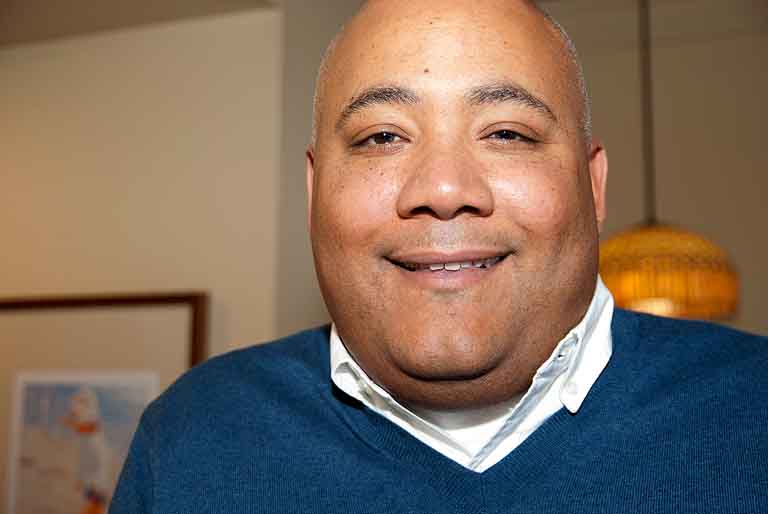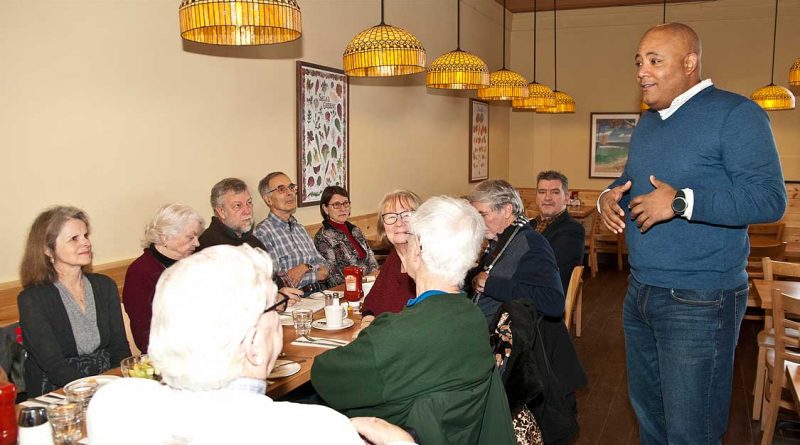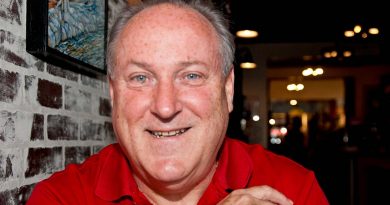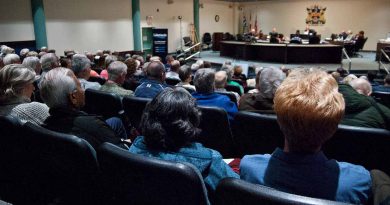Michael Coteau, A Breath Of Fresh Air
Analysis By John Swartz
By the end of the day March 7, the Ontario Liberal Party will have a new leader. Candidates are making the rounds to ridings looking for support and MPP Michael Coteau (Don Valley East) was in Orillia Monday to meet at the Sunset Grill with local riding stalwarts and some people planning to attend the convention in Mississauga.
He is up against five other candidates: former MPP (Vaughan ) and cabinet minister Steven Del Duca, Western University academic Kate Graham, Ottawa lawyer Brenda Hollingsworth, MPP Mitzie Hunter (Scarborough—Guildwood) and education administrator Alvin Tedjo.
Coteau is a three term MPP and served three terms on his local school board. The most striking thing about him is how he talks. He’s doesn’t try to school his audience like so many politicians do, speaking as though they have information others don’t and the most important thing is for the audience to understand their viewpoint – because you just don’t know.
Speaking with SUNonline/Orillia, the initial conversation is about what he thinks went wrong for the Liberals in the last election.
“Fifteen years is a long time for any political party to be in power in this country,” Coteau said. “There were a lot of positive changes that took place over the last 15 years, but there was a lot of (voter) frustration with decisions that were being made,”
“The decisions around things like Hydro that was misaligned with where the people of Ontario wanted to go. It compromised what Liberals and Ontarians consider their values and it contributed to this coalition of opposition that Doug Ford was lucky to step in and inherit.”
He doesn’t use Ford’s name often, and a lot of what he said to SUNonline, and then to party supporters, was about focusing the direction of the party on what they can do, and not making it about the leader of their opposition.
“This is not about Doug Ford and this is not about the big fight,” he said of the task by way of criticizing the strategy of his chief opponent’s (Del Duca) focus and platform.
“If we define ourselves as Liberals by the fight we have to take on with Doug Ford, I think we are going to fail eventually. It’s short–term thinking.”
Instead he spoke of his vision of how to create policy based on traditional party values of inclusion and support for one and other. He has some ideas of what needs attention, some idea of how he thinks policy should address issues, but leaves room to collect advice and insight from others. Many of the others are rural and northern residents who overwhelmingly did not vote Liberal in the last election.
“I think the lessons are obvious when it comes to going from a majority government to six seats in the legislature,” said Coteau, “it’s the clearest message that anyone can receive.”
“I think the way we communicate needs to change as a party. I also think as we implement decisions and programs we have to do it in a way where people feel like they are part of it and they are on board.”
“The Ontario Liberal Party was a rural based party for many years. The party eventually transformed into more of an urban based party. I think that people in rural Ontario have felt like they have been left out from the decision making at Queen’s Park and we’re going to build a team of Liberals across the province that can realign the priorities of Queen’s Park with priorities of rural Ontario, Northern Ontario and many other communities that don’t feel they are being represented.”
This writer has asked every politician within earshot from the federal level through to municipal the same question for the last three years. It’s about the emerging new economy – automation, artificial intelligence, technology advances and how it will leave many people behind, unemployed. To a person, none have given any indication they remotely understand the scale and scope, especially the speed of change bearing down, except for Coteau. He referenced the subject before the question could be asked.

“This is the biggest problem with politics today. We have people who are making decisions on behalf of Ontarians that can’t explain to you what blockchain technology is, they can’t explain to you how automation, AI, and the electric battery are going to transform the way we move from place to place,” he gave as an example of one aspect of change.
“The transformation of our economy is going to be reflected in the workforce, it’s going to be reflected in our daily lives and Ontario needs to position itself to ensure it benefits from the shift because if we don’t do that we will be left behind,” he gave as another. He also said investment in new technology, particularly foreign investment has to be done differently to ensure investment isn’t just a vehicle to suck profits out of the Ontario economy in benefit those off shore.
“Most of all, aligning policy and regulation to where (current Canadian) companies are, and people are, going and not to where politicians think we should be,” he said in recognition politicians are least equipped – and SUNonline agrees based on the lack of acceptable responses by others to questions in this area – to be setting the rules for something they don’t understand.
Plenty has been written about and forecasts made many people will be out of work as their jobs disappear and many of those people will be unable to be retrained because they lack aptitude to, say, become a programmer. It’s a big challenge. Coteau wants to have a plan and be ready to help people move toward what will be the new kind of work available.
“I believe half of the jobs that will exist ten years from now, we don’t even know what they are. I’m an optimist when it comes to the economy and building it. I’m not one of these people who believe we are going to have less opportunity.”
He argues carrying out a program such as the abandoned universal income program – which he thinks should be restarted (conservatives cancelled the trial program before the first year test period was completed) and gradually expanded as funding mechanisms are created, rather than implemented across the aboard all at once – depends on restructuring taxation. He made it clear he doesn’t mean more taxation.
For example, the current tax system was created on bricks and mortar places of employment models which are rapidly disappearing. Businesses are finding ways to go digital and the tax system doesn’t recognize that kind of economic activity to the same degree. One can surely see a disparity in how any government will generate revenue at similar levels in the future and lower revenue will affect everything from health care to education and infrastructure.
“I’m just arguing we need to realign the taxation system with where that growth is going to be,” Coteau said.
What this writer has learned and observed is many people are thinking of a future which extends beyond the next election date. Some are developing the tools to make a better life, and some are afraid of what those tools will mean to their livelihood. The bottom line is if the new economy passes Ontario by, the very means of paying for healthcare, education, public transportation, mitigating climate change, and everything else one can think of is jeopardized.
Coteau’s message seems to be, dragging the province back to a time philosophically when computers in people’s pockets and climate change weren’t on the radar, or focusing only in 4 year increments – how to win the next election and worry about the rest later – is dangerous.
That kind of thinking creates, “so much missed opportunity that’s taking place. It’s like we’re leaking opportunity everywhere. I want to be able to identify the best opportunities out there for people and for this province and really scale it up. That is why I’m running to do this,” Coteau said.
In more than two decades of covering politicians and elections, hearing answers to questions asked, rather than answers from a script or missing the point entirely, is refreshing. There’s a language, a jargon most politicians acquire which allows saying something while saying nothing, allows being politically correct and safe instead of forthright and risking criticism for (soft) word choices; while Coteau is well spoken, he doesn’t fall into that trap, the language of a politician.
Perusing the websites (linked above) of the six candidates reveals stark contrast, particularly between Coteau and Del Duca. Have a look. The difference between old school, how one plays the political game and Coteau is obvious.
The local riding association has extended invitations to all the candidates. Other than Coteau only Del Duca and has been here, though he slipped in and out without fanfare. Whether the other 4 candidates come here may be moot after next weekend, unless they are angling for second round advantage (delegates are locked in for first round voting and no majority winner leads to more rounds in runoff).
Local riding members will vote on delegates to the convention Sunday, February 9 at the legion in Coldwater. The deadline to become a party member and vote for delegates has passed, but regardless of whether this riding joins Coteau’s camp, or whether other ridings do as well, we need more people like Coteau in politics regardless of party affiliation.
(Photos by Swartz – SUNonline/Orillia) Main: Liberal Party leadership candidate, Michael Coteau, addresses Simcoe North riding party members at the Sunset Grill Monday.




